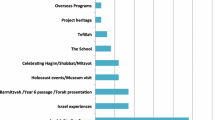Abstract
This paper reports on a qualitative study which generated detailed case study information about the transition experiences of seven Indigenous students as they moved from Year 7 in their community school to Year 8 in their new urban high school context (Rennie, Wallace, Falk & Wignell 2004). In particular the study aimed to document the literacy and numeracy practices valued in the home community, community school and urban high school and highlight any continuities and discontinuities between the various contexts. Data were collected using observations, document analyses and interviews. Students in the study participated in a number of different activities ‘outside of school’ in their home communities including hunting, art, ceremony, cooking, sport and play. There was evidence of literate and numerate practices embedded throughout these activities. The data also showed there were distinct differences in the kinds of knowledge valued in each context investigated. Cultural knowledge was valued in the home community whereas curriculum knowledge was valued in the school community. The students also built other bodies of knowledge through their participation in community activities. These were reflected in the school curriculum and included scientific knowledge, art knowledge, sport and recreational knowledge and work and domestic knowledge. This paper discusses the community literate and numerate practices, and highlights the continuities and discontinuities with the literate and numerate practices that are valued and privileged in the school curriculum.
Similar content being viewed by others
References
Anderson, R.C. and P.D. Pearson (1984) A schema-theoretic view of basic processes in reading comprehension, in P.D. Pearson, ed.,Handbook of Reading Research, Longman, New York, pp.255–292.
Barton, D. (1994)Literacy: An Introduction to the Ecology of Written Language, Blackwell, Cambridge.
Barton, D. and M. Hamilton (1998)Local Literacies: Reading and Writing in One Community, Routledge, London.
Barton, D., M. Hamilton and Roz Ivaniã, eds., (2000)Situated Literacies: Reading and Writing in Context, Routledge, New York.
Bell, J.S. (1997)Literacy, Culture and Identity, Peter Lang, New York.
Cairney, T.H. and J. Ruge (1997)Community Literacy Practices and Schooling: Towards Effective Support for Students, Department of Employment, Education, Training and Youth Affairs, Canberra.
Collins, B. (1999)Learning Lessons: An Independent Review of Indigenous Education in the Northern Territory, Northern Territory Department of Education, Darwin.
DEET (2002)Annual Report 2001 – 2002, Northern Territory Department of Employment Education and Training, Darwin.
Dyson, A.H. (1997) Children out of bounds: The power of case studies in expanding vision of literacy development, in J. Flood, S. Brice Heath and D. Lapp, eds.,Handbook of Research on Teaching Literacy through the Communicative and Visual Arts, International Reading Association, New York, pp.167–180.
Falk, I. and Balatti, J. (2004) Identities of place: Their power and consequences for VET, in Golding, B. and J. Potter, eds.,Learner and Practitioner: The Heart of the Matter, AVETRA, ACT.
Ferdman, B.M. (1991) Literacy and cultural identity,Harvard Educational Review, vol. 60, no. 2. pp.181–204.
Fleer, M. and D. Williams-Kennedy (2001)Building Bridges. Literacy Development in Young Indigenous Children, Australian Early Childhood Association Inc, Canberra.
Fosnot, C.D., ed. (1996)Constructivism: Theory, Perspective and Practice, Teachers College Press, New York.
Gee, J. (1996)Social Linguistics and Literacies: Ideology in Discourses, Taylor and Francis, London.
Gee, J. P. and J. Green (1997) Discourse analysis, learning and social practice: A methodological study,Review of Research in Education, vol. 23, pp.119–169.
Godley, A.J. (1998) Rewriting identity: Social meanings of literacy and ‘revisions’ of self,Reading Research Quarterly, vol. 33, no. 4, pp.416–433.
Guba, E. and Y. Lincoln (1981)Effective Evaluation, Jossey-Bass, San Fransisco.
Guofang, L. (2000) Family literacy and cultural identity: An ethnographic study of a Filipino family in Canada,McGill Journal of Education, Winter, pp.1–14.
Heath, S.B. (1986) What no bedtime story means: narrative skills at home and school, in B.B. Schieffelin and E. Ochs, eds.,Language Socialization Across Cultures, Cambridge University Press, Cambridge, pp.97–124.
Hill, S., B. Comber, W. Louden, J. Rivalland and J. Reid (2002)100 Children Turn 10, DEET, Canberra.
Hill, S., B. Comber, W. Louden, J. Reid and J. Rivalland (1998)100 Children go to School: Connections and Disconnections in Literacy Development in the Year Prior to School and the First Year of School, Department of Training, Employment and Youth Affairs, Canberra.
Lincoln, Y.S. and E.G. Guba (1985)Naturalistic Inquiry, Sage Publications, California.
Miles, M.B. and M.A. Huberman (1994)Qualitative Data Analysis, Sage Publications, California.
Ramsey, G. (2004)Report on Future Directions for Secondary Education in the Northern Territory, Charles Darwin University, Darwin.
Reid, J., H. Edwards and K. Power (2004) Early literacy education in rural communities: Situating development,Australian Journal of Language and Literacy, vol. 27, no. 2, pp.128–141.
Rennie, J., R. Wallace, I. Falk and P. Wignell (2006)Discontinuities in Literacy and Numeracy Practices between Indigenous Community Schooling and Urban High School, Commonwealth of Australia.
Steffe, L. and J. Gale, eds. (1995)Constructivism in Education, Erlbaum, Hillsdale, New Jersey.
Street, B.V., ed. (1993)Cross-Cultural Approaches to Literacy, Cambridge University Press, Cambridge.
Author information
Authors and Affiliations
Rights and permissions
About this article
Cite this article
Rennie, J. Meeting kids at the school gate: The literacy and numeracy practices of a remote indigenous community. Aust. Educ. Res. 33, 123–140 (2006). https://doi.org/10.1007/BF03216845
Issue Date:
DOI: https://doi.org/10.1007/BF03216845




